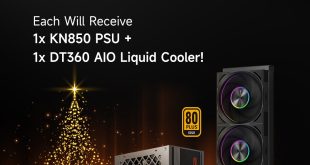The Synology DiskStation DS1512+ ships in a heavy brown box with the name of the product listed on the side.
Inside, the NAS is protected inside a protective cover and sandwiched between heavy duty foam surrounds.
Synology include a user manual, software disc, locking keys, mounting screws and power cable. They also bundle two RJ45 cables to avail of the Link Aggregation support.
We do recommend you ignore the software on the disc and get the latest downloads direct from the support website. Synology update their software on a regular basis, so it does make sense to snag the latest revisions.
The Synology DiskStation DS1512+ is a chunky cube shaped NAS which looks almost identical to the older DS1511+ which we reviewed in January 2011. The company name is embossed into the metal side panel.
The build quality is exceptionally good. It weighs 4.25kg and measures 157 x 248 x 233 mm.
The rear of the DS1512+ is home to a wealth of connectivity. There are four USB 2.0 and two USB 3.0 ports for external devices, as well as two eSATA ports. There are two GB LAN ports to offer support for link aggregation. A security lock is also positioned underneath the power connector port.
This latest version is a much more ‘intelligent' design, as both 80mm fans can be removed from outside the chassis. Ideal for general fan maintenance, and for potentially replacing them without being forced to dissemble the unit completely.
Underneath are four large, rubber covered feet which ensure stability on a variety of surfaces.
Each of the five drive bays are easily removed, by pressing in on the clips.
These drive bays are sadly constructed from a durable plastic, not metal. You need to aim higher up the food chain for the metal bays.
The eSATA ports can be used to connect two DX510 units, which house another 5 drives each. A total of 15 hard drives with a maximum size of 4TB each , offering a total of 60TB of storage capacity. KitGuru has already reviewed the DX510 expansion bay, you can read about it over here.
With the five drive bays removed, we can get a quick glimpse inside the unit. The daughter card contains 5 SATA connectors and 5 power connectors. This is connected to the main motherboard at the side.
The power supply is strapped into place at the side of the DS1512+ and connected across the top of the unit to the motherboard.
Synology are using a new dual core Intel 2.13ghz processor in the DS1512+. This has been upgraded from the 1.8ghz D525 Atom Processor which featured in the DS1511. There is 1GB of DDR3 memory installed, and this is expandable up to 3GB if you find that your database intensive demands can benefit from more memory.
Synology are using a high quality 250w Seasonic power supply, which is 80 Plus Bronze Certified.
As we mentioned earlier in the review, the DS1512+ features plastic drive bays, although they feel strong enough to last the test of time. That said, we would prefer to see metal bays adopted in this model for total peace of mind. At least the new model uses a key locking system, which works on a drive per drive basis.
Each of the drives are mounted by 3 screws on either side of each drive bay. It is a painless system and only takes a few minutes. Although we are using 3.5 inch drives in these images, the trays also accommodate 2.5 inch units. Drives can be configured in Synology Hybrid RAID, Basic, JBOD, RAID 0, RAID 1, RAID 5, RAID 5+Spare, RAID 6, RAID 10 configurations.
 KitGuru KitGuru.net – Tech News | Hardware News | Hardware Reviews | IOS | Mobile | Gaming | Graphics Cards
KitGuru KitGuru.net – Tech News | Hardware News | Hardware Reviews | IOS | Mobile | Gaming | Graphics Cards



























they do make some fantastic products. i still need to get one of their dual bay NAS systems for my house.
Any recommendations?
Its great, but it seems to have increased in price by about £100 over the last revision a year earlier, or am I missing something?
thankfully HDDs have dropped in price recently, or that would be expensive. imaging having a 60TB NAS in the house?.!